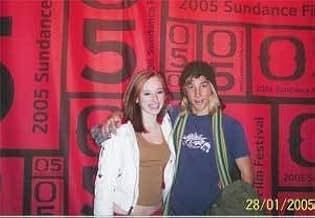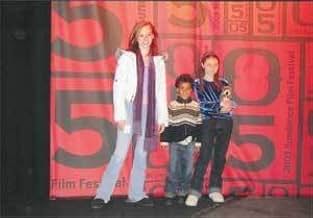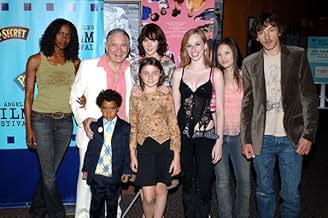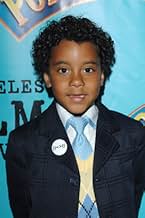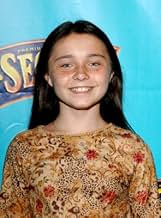Ein einsamer Schuhverkäufer und ein exzentrischer Performance-Künstler kämpfen um eine Verbindung in dieser einzigartigen Sichtweise des zeitgenössischen Lebens.Ein einsamer Schuhverkäufer und ein exzentrischer Performance-Künstler kämpfen um eine Verbindung in dieser einzigartigen Sichtweise des zeitgenössischen Lebens.Ein einsamer Schuhverkäufer und ein exzentrischer Performance-Künstler kämpfen um eine Verbindung in dieser einzigartigen Sichtweise des zeitgenössischen Lebens.
- Auszeichnungen
- 22 Gewinne & 15 Nominierungen insgesamt
Empfohlene Bewertungen
Much lighter and brighter than Todd Solondz chilling yet profoundly human film 'Happiness.' I felt they were similar in that they explored the strange things people do and say and the believable motivation behind them. Christine (reminiscent of Maggie Gyllenhaal) is a detached yet thoughtful artist who longs for romance and love. Richard is a lonely single father struggling to understand where his life is going after a recent separation.
The kids (who are each some of the best parts of this film) are caught up in an adult world figuring out who they are and where they fit in. This is an enjoyable dark comedy that had the crowd laughing at some parts and gasping at others. I left the theater satisfied and smiling.
The kids (who are each some of the best parts of this film) are caught up in an adult world figuring out who they are and where they fit in. This is an enjoyable dark comedy that had the crowd laughing at some parts and gasping at others. I left the theater satisfied and smiling.
The main reason that films can grab us and last is not because of characters or situations, or story. Yes, those are the things we see and grab, but if the film doesn't spin an engaging world, there'll be nothing worth grabbing.
Now here's a case where the world this filmmaker creates is so wonderful, we want to grab everything. Its incoherent, a set of vignettes, but all coherently placed to circumnavigate this wonderful set of dynamics.
Its a world where bad things exist but don't cut deeply. Where innocence penetrates reality. Where fate applies but is seen. Where art exists but only as pretense for life. Where communication always has a sparkle of wonder. Where age is irrelevant and hope is always privately platformed without dependence.
A dear friend brought me to "I've Heard the Mermaids Singing." This is a dear friend and I sincerely tried to dissolve myself in the world of the thing. But the cracks didn't line up, and my being and that world couldn't interpenetrate. It think it is purely a matter of skill, in knowing how to discard the things that get in the way. This does, this film here.
The woman behind this film is admirable. By that I mean she is to be admired for knowing enough about us to find the things that disturbingly endear. And I admire her for finding a place for herself in how this is presented to us. Its all so perfect that we have to assume that there is a deep selfawareness in her, as deep as her intuitions are.
I hope to see more of her. I think we can trust her with large bits of ourselves.
Ted's Evaluation -- 3 of 3: Worth watching.
Now here's a case where the world this filmmaker creates is so wonderful, we want to grab everything. Its incoherent, a set of vignettes, but all coherently placed to circumnavigate this wonderful set of dynamics.
Its a world where bad things exist but don't cut deeply. Where innocence penetrates reality. Where fate applies but is seen. Where art exists but only as pretense for life. Where communication always has a sparkle of wonder. Where age is irrelevant and hope is always privately platformed without dependence.
A dear friend brought me to "I've Heard the Mermaids Singing." This is a dear friend and I sincerely tried to dissolve myself in the world of the thing. But the cracks didn't line up, and my being and that world couldn't interpenetrate. It think it is purely a matter of skill, in knowing how to discard the things that get in the way. This does, this film here.
The woman behind this film is admirable. By that I mean she is to be admired for knowing enough about us to find the things that disturbingly endear. And I admire her for finding a place for herself in how this is presented to us. Its all so perfect that we have to assume that there is a deep selfawareness in her, as deep as her intuitions are.
I hope to see more of her. I think we can trust her with large bits of ourselves.
Ted's Evaluation -- 3 of 3: Worth watching.
I really loved this film! All the way from the beginning it surprised me at every scene, it was very funny and did not try to overdo its humor, and the characters are unforgettable. To be honest, so many expressions and individual ideas that are conveyed in this movie through its characters, it's kind of hard to pin point what I loved most. It is a sexual film, probably not suitable for the young, but it portrays people as they are, something that we find awkward and strange in this movie - they all exist around us in real life and this film is not afraid to show it. Ultimately we all look for love. In this film, even the strange moments are romantic.
This movie is about people trying to connect with each other, told in a very sweet, original way. It is quirky, beautiful, honest, and hilarious. The film follows the lives and dreams of many truly memorable characters, from the adorable and fascinating children to the adults with all their idiosyncrasies. I couldn't stop thinking about it the day after I saw it. I kept reliving the scenes in my head, and smiling.
I am so happy to have discovered Miranda July. Not only did she write, direct, and star in this film... she is also a performance artist, has released music CDs, and is planning on releasing a book of short stories next.
I'd recommend watching the trailer if you're curious. It definitely gives you a flavor of the film. If you like it, go see the movie, and you may fall in love, too.
After you see it, check out the movie website (http://www.meandyoumovie.com/) and Miranda's website (http://www.mirandajuly.com/) for more great stuff.
I am so happy to have discovered Miranda July. Not only did she write, direct, and star in this film... she is also a performance artist, has released music CDs, and is planning on releasing a book of short stories next.
I'd recommend watching the trailer if you're curious. It definitely gives you a flavor of the film. If you like it, go see the movie, and you may fall in love, too.
After you see it, check out the movie website (http://www.meandyoumovie.com/) and Miranda's website (http://www.mirandajuly.com/) for more great stuff.
Miranda July's "Me and You and Everyone We Know" might be the most miraculous first fiction feature by an American in 3 or 4 years; it's rivaled only by Andrew Bujalski's "Funny Ha Ha." Christine (July) stalks the recently separated Richard (John Hawkes), who would try anything to impress his kids, and gets third degree burns for his trouble. His elder son, Peter (Miles Thompson) longs for connections that go beyond instant gratification, while the younger Robby (Brandon Ratcliff) gets all the funniest lines, mostly copied and pasted from cybersex chats.
"Me and You" is about the act of pretending and about performance as life, but first of all it's about extremely likable characters played by likable actors, foremost among them July herself, whose Carole Lombard-meets-Laurie Anderson deep ditz may be a complex stack of masks upon masks, but is more likely just the way she is.
The movie is notable for what isn't in it - both malice and pain are almost absent. Removing malice - July's world is one in which a kid can safely walk alone through some seedy parts of Los Angeles - is unfashionable, brave and, given the gentle tone of the piece, necessary. But the absence of pain isn't intentional: July would like us to feel the loneliness of the characters. But their isolation is more a trait of their personalities than a source of suffering. In this respect, the movie is perhaps too glossy for its own good. There's one excellent exception, revolving around a granddaughter's photo by an elderly woman's bedside, which becomes a substitute for a shared life that dissolved too soon.
The scene that everyone picks out is the walk to Tyrone Street. Richard and Christine decide the walk to the intersection will stand in for the relationship they're not having: first the unrelieved joy of being together, then the getting bored with each other, then the fighting and the split. Only they keep chatting flirtily, about whether the walk represents a year and a half or twenty, until they get to the corner, and then we wonder how they can possibly go their separate ways. Although this is as great as anything in the first 75 minutes of "Before Sunset," its emphasis is much more on romantic comedy than the rest of the movie. There are more typical scenes that approach this quality. A goldfish on the roof of a car. A child running his fingers through a woman's hair. A picture of a bird in a tree, in a tree. And the ending, where it seems human actions are motivating the sunrise.
The scene I consider the finest is a quiet one: Sylvie (Carlie Westerman), a tween spending her childhood preparing for life as a homemaker, gets a gift from Peter: a plush bird. ("It's for your daughter.") It would be unusual merely for depicting a platonic friendship between kids of different genders and different ages. But it's remarkable for crystallizing what it seems every filmmaker is trying to say these days: that there's something to be gained from thinking like a child. Through July's lens, it doesn't seem like a regression: no redundant literalization of fantasy is necessary. The achievement of "Me and You and Everyone We Know" is to show how the mundane moments of our lives can be mundanely transformed by imagination.
"Me and You" is about the act of pretending and about performance as life, but first of all it's about extremely likable characters played by likable actors, foremost among them July herself, whose Carole Lombard-meets-Laurie Anderson deep ditz may be a complex stack of masks upon masks, but is more likely just the way she is.
The movie is notable for what isn't in it - both malice and pain are almost absent. Removing malice - July's world is one in which a kid can safely walk alone through some seedy parts of Los Angeles - is unfashionable, brave and, given the gentle tone of the piece, necessary. But the absence of pain isn't intentional: July would like us to feel the loneliness of the characters. But their isolation is more a trait of their personalities than a source of suffering. In this respect, the movie is perhaps too glossy for its own good. There's one excellent exception, revolving around a granddaughter's photo by an elderly woman's bedside, which becomes a substitute for a shared life that dissolved too soon.
The scene that everyone picks out is the walk to Tyrone Street. Richard and Christine decide the walk to the intersection will stand in for the relationship they're not having: first the unrelieved joy of being together, then the getting bored with each other, then the fighting and the split. Only they keep chatting flirtily, about whether the walk represents a year and a half or twenty, until they get to the corner, and then we wonder how they can possibly go their separate ways. Although this is as great as anything in the first 75 minutes of "Before Sunset," its emphasis is much more on romantic comedy than the rest of the movie. There are more typical scenes that approach this quality. A goldfish on the roof of a car. A child running his fingers through a woman's hair. A picture of a bird in a tree, in a tree. And the ending, where it seems human actions are motivating the sunrise.
The scene I consider the finest is a quiet one: Sylvie (Carlie Westerman), a tween spending her childhood preparing for life as a homemaker, gets a gift from Peter: a plush bird. ("It's for your daughter.") It would be unusual merely for depicting a platonic friendship between kids of different genders and different ages. But it's remarkable for crystallizing what it seems every filmmaker is trying to say these days: that there's something to be gained from thinking like a child. Through July's lens, it doesn't seem like a regression: no redundant literalization of fantasy is necessary. The achievement of "Me and You and Everyone We Know" is to show how the mundane moments of our lives can be mundanely transformed by imagination.
Wusstest du schon
- WissenswertesThe 1985 Honda Accord Christine drives in the film was July's own car, passed down from her grandmother.
- PatzerWhile Peter and Robby are singing the hymn to Richard, they walk past the same white picket fence three times.
- Crazy CreditsSpecial thanks to The Bertram Family
- VerbindungenFeatured in Siskel & Ebert & the Movies: The Best Films of 2005 (2005)
- SoundtracksWhere Are We Going
Written and Performed by Ryeland Allison
Published by Silver Outlet Music (BMI)
Courtesy of Silver Outlet Music America
Top-Auswahl
Melde dich zum Bewerten an und greife auf die Watchlist für personalisierte Empfehlungen zu.
- How long is Me and You and Everyone We Know?Powered by Alexa
Details
- Erscheinungsdatum
- Herkunftsländer
- Offizielle Standorte
- Sprache
- Auch bekannt als
- Me and You and Everyone We Know
- Drehorte
- Produktionsfirmen
- Weitere beteiligte Unternehmen bei IMDbPro anzeigen
Box Office
- Budget
- 800.000 $ (geschätzt)
- Bruttoertrag in den USA und Kanada
- 3.885.134 $
- Eröffnungswochenende in den USA und in Kanada
- 30.801 $
- 19. Juni 2005
- Weltweiter Bruttoertrag
- 8.012.838 $
- Laufzeit1 Stunde 25 Minuten
- Farbe
- Sound-Mix
- Seitenverhältnis
- 1.85 : 1
Zu dieser Seite beitragen
Bearbeitung vorschlagen oder fehlenden Inhalt hinzufügen

Oberste Lücke
What is the Japanese language plot outline for Ich und du und alle die wir kennen (2005)?
Antwort

